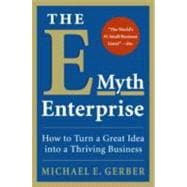
Note: Supplemental materials are not guaranteed with Rental or Used book purchases.
Purchase Benefits
What is included with this book?
The New copy of this book will include any supplemental materials advertised. Please check the title of the book to determine if it should include any access cards, study guides, lab manuals, CDs, etc.
The Used, Rental and eBook copies of this book are not guaranteed to include any supplemental materials. Typically, only the book itself is included. This is true even if the title states it includes any access cards, study guides, lab manuals, CDs, etc.
Chapter One
The E-Myth Enterprise and the Position of One: A Business Exists Only as it is Preceived by Others
In too many situations we automatically experience people as “themâ€â€”not “us.†These jungle-type habits of mind are dangerous to our species.This book is meant to be a prescription for building a successful business in a free market system. As you will find out, it probably serves as well—if not better—as a polemic against such prescriptions.
Please excuse the apparent contradiction. I know that if you’re patient, somewhere in the middle resides a truth worth digging for. But to get there, you’re going to have to do some of the work. You’re going to have to stretch where I stretch and let go where I let go.
In other words, you’re going to have to be willing to play an always frustrating, but sometimes enlightening, game, a game I call how do you provide an answer to a question that you know has no answer?
In a free market system, that’s the game called business.
To anyone with even a passing interest in the comings and goings of the free market system in the United States, it should be apparent that the life of a business here is a precarious thing. If the business is a good idea—that is, if it does all the right things in the right way and at the right time, and is lucky—it succeeds.
If it’s a bad idea, it doesn’t.
Even worse, it could appear to be a good idea, but shifts—more like earthquakes—in the economy can sink it. Wasn’t Washington Mutual a good idea? Wasn’t Fannie Mae? Wasn’t Lehman Brothers? Wasn’t AIG?
Unfortunately, the truth is that for the -people who invest in other -people’s businesses, for those who start a business of their own, or for those who work for either of the other two, most businesses turn out to be bad ideas; most businesses fail. Even the so-called giants.
More frustrating is that, in a free market system, even the good ideas—the businesses that succeed—turn into the bad ideas in time.
The weather changes. A new company moves in across the street. People stop having babies. Somebody comes up with a better idea. The economy experiences a so-called correction. Or—and this happens—someone comes up with a worse idea but implements it better.
In short, a free market system provides all of us with significantly more opportunity to fail than to succeed.
What worked yesterday will most likely not work today, and the fact that something works today is insufficient justification for planning to do it the same way tomorrow.
How can we minimize the risk?
If an estimated six out of ten companies funded by professional venture capitalists go under (some estimates run as high as 90 percent*), how can anyone else expect to do better? Shouldn’t we be able to expect better in a world with so much information at hand, with so much technical and technological know-how at our disposal, and with so many well-trained managers available?
For years, clients have been asking me those very questions.
Is there a common denominator we can use to take a more accurate measure of a business idea?
Is there a pattern—a template—we can use to evaluate a business and its likelihood of achieving significant success?
Is there something all great businesses do that can be replicated by other businesses wishing to become great?
Is there a way to clone greatness?
I believe the answer to each of these questions is yes.
This book is my answer to those thousands of clients and business-people who have asked me these questions over the years, as well as to the millions of entrepreneurs, would-be entrepreneurs, and managers I have never met to whom these questions are just as important.
In a deceptively thin book, I have organized the fundamental principles that I believe form the foundation of every lasting great business into a template or model of greatness, the presence of which in any business would indicate with a great degree of certainty what I call the success-proneness of that business, and the absence of which would indicate that a business is not likely to pass the test of time.
The value of this template is that it is timeless. It will work for any enterprise, any time, at any place in the world.
It transcends epochs, technology, industry, markets, economies, and geography.
It could have been implemented as effectively in the nineteenth century as it is now.
It could be put to good work just as effectively in the emerging Eastern European free market experiment, as it could in the United States free market’s attempt to recapture its own lost glory.
It could just as well be applied to a corner grocery store as to a semiconductor plant in Chandler, Arizona, or an iPod factory in China.
The reason it is so timeless and so transferable is because it is founded upon the one sacrosanct requirement upon which the existence of every business in a free market system always has depended, and always will depend.
The E-Myth Enterprise
Excerpted from The E-Myth Enterprise: How to Turn a Great Idea into a Thriving Business by Michael E. Gerber
All rights reserved by the original copyright owners. Excerpts are provided for display purposes only and may not be reproduced, reprinted or distributed without the written permission of the publisher.